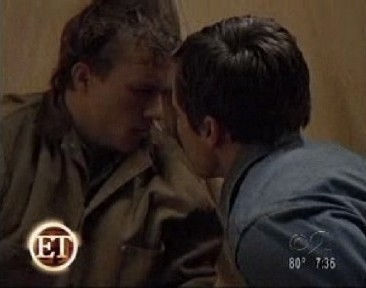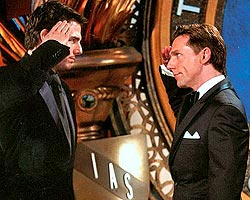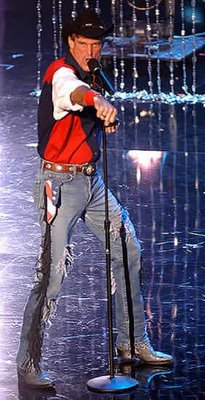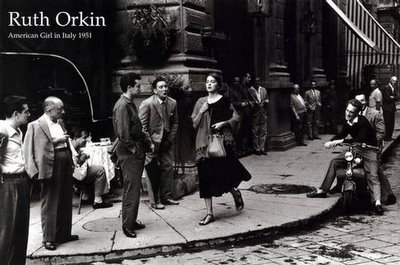critiquing the played-outness of Madonna. Which, well, yes; but, also, um, hello, Ms. Pot, Ms. Kettle is on line 2 for you.
No, really, I like Paglia better in "laughably overblown pop culture critique" mode than in "repellant proto-Ann Coulter mode;" but still, honEY:
"My blood boiled at this insulting reduction of dance music to gymnastics -- mere recreational aerobics. I for one do not dance to dance music; disco for me is a lofty metaphysical mode that induces contemplation."
Fuck, me too.
She does at least aside that "(Of course, this may partly descend from my Agnes Gooch marginalization in the old bar scene, where I was -- as Nora Ephron would say -- a wallflower at the orgy)", so I suppose one could be generous and give her credit for some humorous self-awareness there. Personally, I still contend that she's a pretentious poop with an ego the size of the Crab Nebula, no matter how 90's style so-self-referential-I-may-disappear-up-my-own-asshole ironic she's supposedly being about it. I mean:
"Some journalists from newspapers and magazines that planned for reviews to appear, as is customary, at the release date were forced to make pilgrimages to designated offices for "listening sessions" (sounds like something out of a Hillary campaign), where they heard the album under controlled and presumably optimal conditions. This authoritarian strategy (which I rejected outright when Salon told me about it)"
Oh, go you. Paglia: perpetual fiery crusader against auTHORitah, from Hillary to the music industry's P.R. tactics. We can all rest easy now.
And, AND
"When I wrote in my polemical 1990 New York Times op-ed that "Madonna is the future of feminism," there were squawks of disbelief on all sides -- but that is exactly what came to pass over the next decade."
Uh huh. Because nobody--nobody!--else, certainly not in feminism, was "pro-sex" in the early 90's. Except Paglia and her fantasy snog Madonna.
Susie Bright had a fun little take on her, too, back in the day:
"Then, in 'Esquire,' Paglia flatly declared lesbians to be sexually and intellectually 'inert.' Well,
you haven't gotten any in a long time, I thought."
--"Undressing Camille"
Later, Bright interviews Paglia, who'd first introduced herself by making a spectacle of herself in a bookstore: leaped out of her seat and interrupted Bright in the middle of a reading, thrusting her own reviews in Bright's face and shouting about how she was her "only friend in academia." The interview itself is telling. Bright keeps trying to pin her down, and Paglia keeps shifting from subject to subject; the main theme in her responses seems to be that while she luurrves Bright, just about everything else is grievously disappointing, (from S/M to "diesel dykes" to of course the entire feminist movement), and the reason she can't get any, one is drawn to conclude, is that she's just too damn rebellious, and, in her own words, "a new thinker, and I have
the most comprehensive vision of sexuality in the world right now..."
This, she says to
Susie Bright (who's a lot more diplomatic about her in the essay than it comes off from this snippet, p.s.)
My very favorite take on Paglia remains Molly Ivins' piece, "I am the Cosmos:"
"...Paglia's view of sex--that it is irrational, violent, immoral, and wounding--is so glum that one hesitates to suggest that it might be instead, well, a lot of fun, and maybe even affectionate and loving.
Far less forgivable is Paglia's consistent confusion of feminism with yuppies. What
does she think she's doing? Paglia holds feminists responsible for the blizarre blight created by John T. Malloy, author of "Dress for Success," which caused a blessedly brief crop of young women, all apparently aspiring to be executive vice presidents, to appear in the corporate halls wearing those awful sand-colored baggy suits with little floppy bow ties around their necks.
Why Paglia lays the blame for this at the feet of feminism is beyond me. Whatever our other aims may have been, no one in the feminist movement ever thought you are what you wear. The only coherent fashion statement I cn recall from the entire movement was the suggestion that Mrs. Cleaver, Beaver's mom, would have been a happier woman had she not persisted in vacuuming while wearing high heels. This, I still believe.
...What we have here, folks, is a crassly egocentric, raving twit.
...One of [Paglia's] latest efforts at playing enfant terrible in intellectual cricles was a peppy essay for
Newsday, claiming that either there is no such thing as date rape or, if there is, it's women's fault because we dress so provocatively. Thanks, Camille, I've got some Texas fraternity boys I want you to meet.
There is one area in which I think Paglia and I would agree that politically correct feminism has produced a noticeable inequity. Nowadays, when a woman behaves in a hysterical and disagreeable fashion, we say, "Poor dear, she probably has PMS." Whereas if a man behaves in a hysterical and disagreeable fashion, we say, "What an asshole." Let me leap to correct this unfairness by saying of Paglia, "Sheesh, what an asshole."'
--Mother Jones, October 1991





 Cruise exchanges the secret exorcise-Xenu signal with his mentor/commander David Miscavige.
Cruise exchanges the secret exorcise-Xenu signal with his mentor/commander David Miscavige. 





